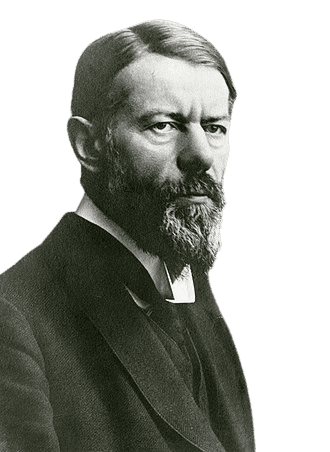Life and achievements
Early life
Max Weber was born in 1864 into an upper-middle-class, scholarly family in Erfurt, Prussia. His father, Max Weber Sr., was a successful lawyer and politician, and his mother, Helene Fallenstein, was a strict Calvinist. This environment influenced young Weber and introduced him to political and religious aspects of life.
In 1869, his family migrated to Berlin, where his father became much engaged with the National Liberal Party. It is important to note that the Weber family was a family of scholars, and they entertained a lot of intellectuals, including philosophers and historians, and this played a significant role in shaping Weber's intellect.
Weber received his early education in Berlin, where he joined some of the best schools and did well academically.
However, he had problems with his father's obsession with money and his mother's religious fanaticism.
Weber developed his interests in history and philosophy as a teenager.
At the age of 13, he was writing academic essays on the history of Germany and Rome, which proved his precociousness.
His passion for law made him join Heidelberg University to pursue his doctorate.
His initial academic research was on Roman agrarian history and law—the background to his sociological theories.
Legacy
Max Weber's contribution to sociology as one of the founders of modern sociology is vast.
His works, especially those dealing with power, authority, and bureaucracy, are still core to sociological analysis.
He is frequently associated with the role of rationalization in the formation of modern society, in which people replace traditions with order and efficiency of bureaucracy.
His contribution towards the understanding of the Protestant ethic and the spirit of capitalism remains relevant in the knowledge of the culture of capitalism.
Weber has significantly contributed to sociology, political science, economics, and religious studies.
He has given ideas about authority and social stratification influencing modern governance and power relations theories.
Unfortunately, Weber died at a relatively young age.
However, he left several works, including the posthumously published Economy and Society, which is still widely discussed in academia and beyond.
Join Confinity and create a lasting digital legacy, just like history's greatest minds. Signup Now
Learn how this historical figure's legacy continues to shape our world today →
Milestone moments
May 1, 1864
Birth of Max Weber
Maximilian Carl Emil Weber was born in Erfurt, Prussia, in a well-off family with a political and academic background.
His father was a lawyer and a politician, and his mother was religious, which provided a background that influenced Weber's interest in sociology, law, and philosophy.
Nov 13, 1894
The Chair of Political Economy at the University of Freiburg
Weber got his first full professorship at the University of Freiburg.
This was his first academic appointment, and during this period, he was formulating his ideas on capitalism, religion, and society.
Nov 19, 1905
The publication of Max Weber's work entitled "The Protestant Ethic and the Spirit of Capitalism."
Weber's seminal work linked Protestant ethics to the development of the capitalistic system in the Western world.
This text became one of his most essential contributions to developing economics, sociology, and religious studies.
Feb 14, 1917
Lecture: In the article "Science as a Vocation."
Weber presented one of his most well-known speeches, "Science as Vocation," in which he discussed the position of scientific investigation in the modern world.
He emphasized the process of rationalization.
